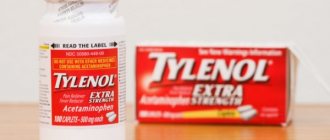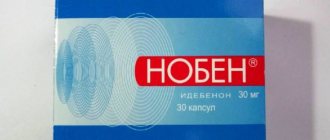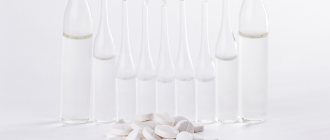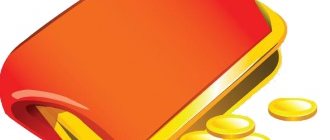Synonyms: Memoria
The homeopathic remedy Memoria has a beneficial effect on memory and blood circulation in the brain. This drug increases brain metabolism and also has a nosotropic effect, increases vascular elasticity, and enriches blood, cells and tissues with oxygen. It is very effective in cases of strong mental stress, increases concentration and has a positive effect on learning ability. Memoria has a good effect on the recovery of the body after traumatic brain injury and concussion, especially if the patient is in a state of prostration. The homeopathic remedy slows down age-related changes and has a positive effect on the emotional state of the patient.
Pharmacodynamics and pharmacokinetics
Pharmacodynamics
Memoria has a complex effect on brain metabolism . The drug improves hemodynamics and oxygen supply to all brain tissues, relieves vascular spasms, normalizes the metabolic process and the energy potential of nervous system cells, improves blood circulation in the vessels of the eyes and brain.
Affects the process of platelet aggregation, improves membrane-stabilizing properties , which enhances the strength and elasticity of blood vessels. As a result, the symptoms of cerebral circulation disorders that develop against the background of trauma to brain structures are quickly relieved - headaches, tinnitus, head noise, frequent dizziness, irritability, anxiety, emotional lability, asthenia, depressive symptoms .
The drug improves memory , concentration during mental work, associative processes, increases ability to work and the speed of psychomotor reactions. Memoria increases learning ability, restores clarity of consciousness, and slows down the development of age-related changes in brain structures.
Pharmacokinetics
Data not provided.
Pharmacological properties of the drug Memoria
The drug has nootropic, vasoregulatory and antihypoxic effects: reduces permeability, increases elasticity, reduces the severity of reactions of the vascular wall to biogenic vasopressor substances; normalizes blood circulation and tone of cerebral vessels, improves oxygen supply to brain tissue, normalizes metabolic processes, energy potential and increases the resistance of brain cells to hypoxia. Improves the rheological properties of blood, inhibits platelet aggregation, restores blood flow in the vessels of the fundus. Eliminates symptoms that develop against the background of cerebral circulation disorders and traumatic brain injuries: headache, dizziness, tinnitus, memory impairment, decreased concentration, fatigue, irritability, anxiety, dysphoria, emotional lability, depressive disorders of a neurotic nature. Memoria restores and stimulates associative processes, integrative brain activity, improves cognitive functions: increases the volume of operational and long-term memory, improves the ability to concentrate, and increases the speed of psychomotor reactions. Activates the thinking process, improves learning ability and tolerance of intellectual stress. Slows down involutional changes in brain tissue.
Indications for use
Memoria is prescribed for the treatment of disorders of brain activity and cerebral circulation, therapy of cerebral atherosclerosis , injuries with damage to brain structures.
The drug is indicated for memory loss , impaired concentration, high intellectual stress, as well as for migraines , dizziness, and headaches.
Instructions for Memoria (Method and dosage)
The drug is prescribed to adults and adolescents, 10 drops orally 3 times a day. Memoria drops are taken half an hour before or 1 hour after meals in their natural form, or the drops are diluted in a tablespoon of water. The duration of treatment is 60-90 days. If necessary, a second course of treatment is possible according to indications.
If quick relief of symptoms is required, the drug can be taken 8 drops every 0.5-1 hour, not exceeding eight times a day, and after relief of symptoms, switch to taking it three times a day.
The instructions for use of Memoria recommend holding the drug in your mouth for some time before swallowing the drops, which increases the effectiveness of its action.
Composition of the drug Memoria. Release form
Memoria drops are dark yellow or light yellow in color. The drug does not have a distinct odor and is available in dark glass bottles with a dispenser. Bottles of 20ml, 50ml or 100ml are packed in cardboard boxes with instructions for use.
Memoria tablets are white, sometimes interspersed with gray. Flat, small in size. Blisters are packed in cardboard boxes with instructions.
The composition of the drug Memoria per 100 ml includes the following components:
- St. John's wort (Hypericum) D1 15 ml;
- Ginkgo biloba (Ginkgo) D6 10 ml;
- Spotted hemlock (Conium) D6 10 ml;
- Ginseng D6;
- Mountain arnica (Arnica) D12;
The excipients are:
- Ethanol 43%;
- Purified water.
During storage of the drug, the liquid may become cloudy and a small sediment may appear. The taste and smell of the drops may change. This does not affect the quality of the homeopathic remedy and it can continue to be used.
The drug should be stored at room temperature. The shelf life of Memoria is 5 years.
Interaction
When using the drug, it is necessary to take into account that St. John's wort, which is part of it, can change the effectiveness of the therapeutic effects of a number of drugs: it enhances the antidepressant effect of monoamine oxidase inhibitors .
When used together with Fluoxetine , sertraline , Paroxetine , Citalopram or fluvoxamine :
- complicates hemolytic reactions;
- may enhance the photosensitizing effect of sulfonamides , tetracyclines , Piroxicam , thiazide diuretics ;
- reduces the hypotensive effect of Reserpine ;
- reduces the blood concentration of Digoxin , Cyclosporine and the effectiveness of treatment with indinavir ;
- reduces the effectiveness of anticoagulants ( Phenprokumon , Warfarin ).
Analogues of the drug Memoria
There are no complete analogues of this drug. But there are medicines that are similar in composition and indications for use. You should not replace Memoria with similar products yourself, otherwise the effect may be completely different from what is expected.
Analogues of Memoria include the following drugs:
- Bilobil;
- Neuroximet;
- Tanakan;
- Alcheba;
- Memoplant;
- And others.
Please note that this article is for informational purposes only. You should not prescribe the drug to yourself or your loved ones; any use of the drug, its dosage or replacement with analogues should be discussed with your doctor. Do not self-medicate.
Reviews about Memoria
Reviews about Memoria are favorable. Students leave especially good reviews about the drug, many of whom take a course of treatment once every six months before or during sessions. There is an improvement in memory and concentration, and the material being studied is better remembered.
A good effect is noted by patients suffering from cerebral vascular spasms . A preventive course of treatment in spring and autumn, when there are strong changes in atmospheric pressure, has a good effect on health. After a course of treatment, headaches, tinnitus, and drowsiness disappear. Many people after 40 years of age use it as a preventive measure.
Pharmacological action of Memoria
Memoria is a complex drug that has a nootropic effect, manifested in the form of improved memory and mental activity, and brain resistance to aggressive external influences.
In addition, the drug has a vasoregulatory antihypoxic effect, improves blood circulation, stimulates the nutrition of cells and tissues with oxygen, and saturates the blood with oxygen.
Memoria's ingredients have a beneficial effect on blood vessels: they reduce the permeability of the walls and reduce susceptibility to vasoconstrictor nutrients. In addition, the components of the drug normalize the blood formula, prevent the formation of blood clots, and improve blood flow in the vessels of the eyes.
Thanks to Memoria, information is remembered better, psychomotor reactions and mental activity improve, learning ability increases, age-related changes in the brain occur more slowly, and clarity of consciousness returns.
There are positive reviews about Memoria from patients suffering from cerebrovascular accidents. Under the influence of the drug, tinnitus, headaches disappear, and absent-mindedness is eliminated. In addition, Memoria successfully combats emotional lability and increased fatigue.
The instructions for Memoria indicate the composition of the drug. It includes: Arnica, Hypericum, Ginkgo, Conium, Ginseng or Ginseng.
Arnica is used to treat contusions, apoplexy, hypertension, painful shock, nosebleeds, fractures, injuries after operations, atherosclerosis, burns and frostbite, boils, hemorrhoids, thrombophlebitis, dizziness when walking, bedsores, weakness, nervous exhaustion, insomnia, hemorrhages in the sclera and retina, paresthesia, and also to relieve numbness in the hands.
Hypericum, one of the components of Memoria, is used to treat injuries to the brain and spinal cord, injuries that provoked a violation of the integrity of the nerves, cachexia, neuralgia, neuritis with accompanying stabbing and shooting pains, epilepsy and neuritis (traumatic), writer's cramp. Hypericum is effective in relieving phantom and headaches, pain in the hip joint, paresthesia, for treating deteriorating memory, eye fatigue, hair loss, nosebleeds, and eliminating eye strain.
Ginkgo, a substance included in Memoria, is used to eliminate cerebral circulation disorders, hearing and memory impairment, absent-mindedness, migraines, vascular atherosclerosis, tinnitus, tremors, chronic fatigue, and problems with impaired motor coordination. Ginko is also used to treat sudden mood swings, apathy, depression and weather dependence.
The next component of Memoria is Conium. Its effectiveness has been proven for sclerosis, paralysis, convulsions, paresis, paresthesia, diplopia, insomnia, presbyopia, cataracts, severe irritability, myopia, fears, severe lacrimation, sudden mood swings, senile farsightedness and photophobia. In addition, Conium is used to eliminate sensations of compression in the temples, dizziness that occurs in a horizontal position, dull headaches that occur mainly in the morning, hot flashes to the back of the head.
Ginseng (Ginseng) is effective for rheumatism, lumbago, headaches, dizziness, sciatica, disturbances in sleep and vision rhythms, and nervous exhaustion.
Memoria price, where to buy
Memoria drops can be purchased in pharmacies in Moscow and other Russian cities. The price of the drug depends on the volume of the bottle. The cost of the drug in a 50 ml bottle ranges from 337 to 420 rubles, and in 20 ml bottles - from 215 rubles. up to 259 rubles.
- Online pharmacies in UkraineUkraine
Pharmacy24
- Memoria 50 ml drops Richard Bittner AG, Austria
194 UAH order - Memoria 20 ml drops Richard Bittner AG, Austria
104 UAH order
Contraindications
Memoria drops are not recommended for children under 12 years of age, but there are cases when a doctor may prescribe a homeopathic remedy. You must strictly adhere to the dosage chosen by the doctor.
If the patient has any liver disease, then it is better to avoid this drug.
Pregnancy and lactation are also contraindications to the use of Memoria, however, in individual cases it can be taken as prescribed by a doctor.
Individual intolerance to certain components of the drug can cause adverse allergic reactions in the body.




